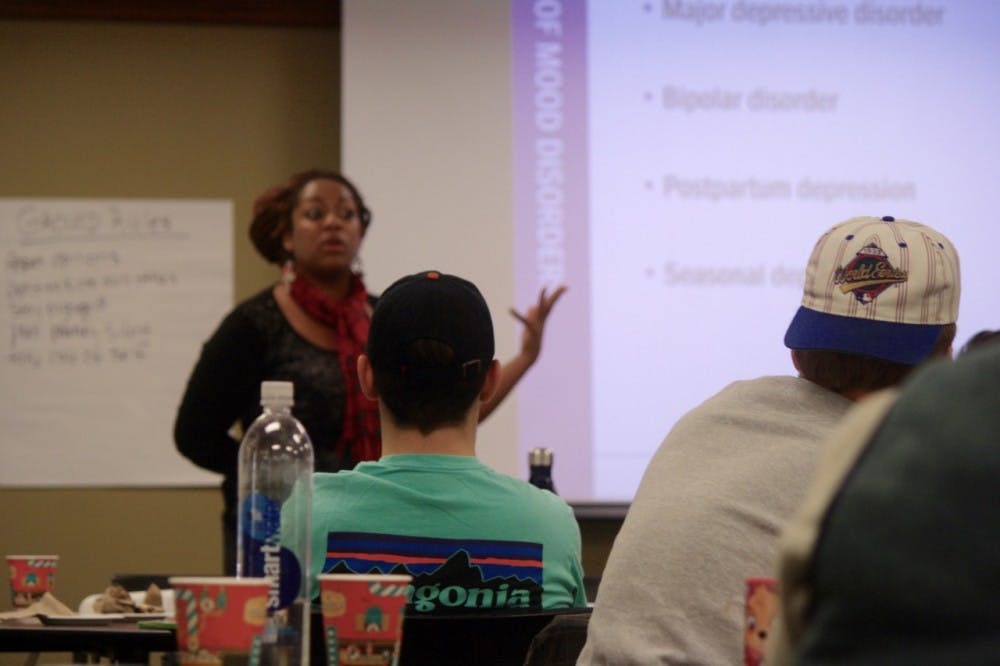The Interfraternity Council (IFC) recently introduced the Mental Health First Aid program in an effort to bolster mental health awareness and resources at the University of Richmond.
This year, Dean Joe Boehman of Richmond College said he has been emphasizing three initiatives: taking care of ourselves, taking care of others and taking care of this place. Each of these initiatives resonated with Dave Fishman, senior, president of the Interfraternity Council.
After being elected IFC president, Fishman began reflecting on needs that he saw within his community. He decided that men on campus could benefit from a mental health initiative. He recognized that for men, the subject of mental health is a difficult one to talk openly about.

“At 2:30 in the morning, your first thought is not ‘I’m going to wake up and call CAPS,'’’ Fishman said. “We’re going to turn to our brothers first, as cliché or cheesy as it sounds.”
The idea was to create a cohort system in which a few representatives of varying grade levels from each chapter would be trained in subjects relating to mental health and available resources to become a person of reference within their respective chapters. Fishman said he envisioned this as a first-responder program where men could feel comfortable approaching their peers in a time of need.
“In the same way that CPR functions as an immediate response and bridge to a higher level of care, so do these skills,” Fishman said, referencing the skills learned through the mental health training.
Fishman’s journey to bring his idea to fruition began in the spring of 2017 when he met with important figures on campus including Meg Pevarski, Assistant Director for Greek Life, Steve Bisese, Vice President of Student Development, Peter LeViness, Director of Counseling and Psychological Services and Boehman.
After extensive research and planning, IFC introduced the Mental Health First Aid program.
This national program teaches the skills to respond to signs of mental illness and substance use, according to the program’s website. The program was then contextualized to fit the needs and climate of campus, Fishman said.
Chosen participants attended one of two eight-hour training sessions offered by the Mental Health First Aid programmers to learn about and discuss mental health issues as they pertained to campus, their friends and fraternity brothers.

Enjoy what you're reading?
Signup for our newsletter
“We wanted to identify people who were passionate about it and who had the skill set and the passion to be able to do it,” Pevarski said. “We wanted to make sure that people felt confident in whoever the resources are.”
Guillaume Diaz, junior, was one of the chosen participants for the program, along with about 30 other men from other grades and chapters.
“After talking with some people and thinking more deeply about the issue itself, I thought it would be a good way to add value as a group and continue to improve what it means to be a part of a fraternity,” Diaz said. “It’s a tough issue and people are so hesitant to talk about it, we want to provide resources and access to help because I think a lot of people don’t know where to start.”
Diaz said that two of his biggest takeaways from the training had been taking care of yourself and others, and recognizing patterns and smaller signs. The training focused on what mental health warning signs look like and how those differ from somebody having a bad week, which can be a difficult distinction without the correct resources and training.
Participants were trained and informed about professional mental health resources both on and off campus, but Bisese emphasized the important role of student responders.
“We are very lucky at the University of Richmond to be on top of that by adding new clinicians and programs, but I think what we’ve also seen is a desire by the students to be a part of it from a response standpoint,” Bisese said. “The things that really make me smile are the work that’s being done around this IFC initiative, PSMAs, the Health Center Bandits and all of the other things that arise that I really don’t take credit for. It’s all because people want to be more effective in caring for their fellow students.”
The IFC Mental Health Initiative is something that current IFC executive members, as well as participants, would like to see remain a part of mental health programming, Fishman said.

“I imagine that if it is an issue with IFC, then it’s probably in all pockets of campus,” Pevarski said. “We can hopefully serve as a pilot program that other organizations or groups on campus could mirror so that that resource is available to them.”
Diaz also emphasized that the mental health issues facing our campus today cannot be solved in a concise timeframe, since these issues do not start or end with one four-year group of students.
“If it helps just one person, that’s a win in my book,” Fishman said.
Contact features writer Sydney Lake at sydney.lake@richmond.edu.
Support independent student media
You can make a tax-deductible donation by clicking the button below, which takes you to our secure PayPal account. The page is set up to receive contributions in whatever amount you designate. We look forward to using the money we raise to further our mission of providing honest and accurate information to students, faculty, staff, alumni and others in the general public.
Donate Now


